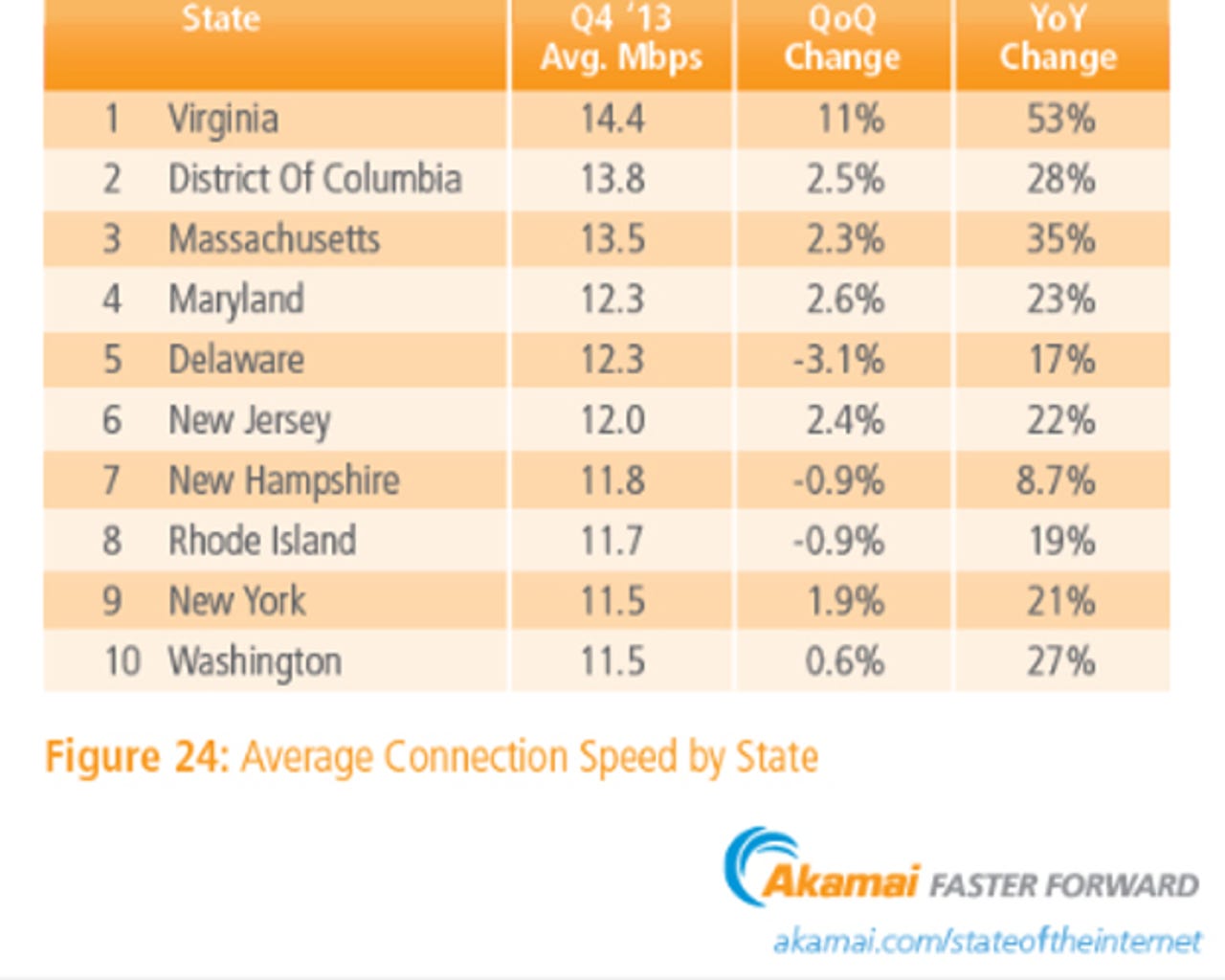The Internet keeps getting faster and more dangerous

Akamai, a leading Internet content delivery network (CDN) company, released its Fourth Quarter, 2013 State of the Internet Report (PDF Link) on April 23rd. The good news is that the global average Internet connect speed keeps getting faster. The bad news is Distributed Denial of Service (DDoS) attacks increased at an even speedier pace.

First, the good news. The average connection speed in the United States reached 10.0 Mbps (Megabits per second), a gain of 2 percent from the previous quarter. Canada reached 9.0 Mbps after a 1.5 percent quarterly increase. Mexico’s 4.0 Mbps average connection speed was the highest among the remaining surveyed countries in the Americas, after growing 2.9 percent quarter over quarter.
In the US, Virginia had the highest average connection speed, at 14.4 Mbps. The state also had the largest quarter-over-quarter speed growth of 11 percent. With the exception of Washington State, the top ten states with fast Internet were all on the East coast.
Featured
According to Akamai, year over year, the global average peak connection speeds increased 38 percent compared to the fourth quarter of 2012. During the last quarter the global average connection speed improved with a quarterly increase of 5.5 percent The global Internet average speed is now 3.8 Mbps. South Korea, as it long has, held the top spot with the highest average connection speed of 21.9 Mbps.
Global high broadband (>10 Mbps) adoption rates in the fourth quarter slowed from previous, double-digit percentage growth to a quarterly increase of 1.6 percent, staying at 19 percent. Year-over-year improvement was strong, however, with the global high broadband adoption rate increasing by 56 percent from the fourth quarter of 2012.
"We’ve reached a significant milestone in the improvement of average connection speeds," said David Belson, editor of the State of the Internet Report in a statement. "The fact that all of the top 10 countries/regions’ average connection speeds are now at or exceeding the high broadband threshold – and continued strong growth in countries like South Korea and Ireland – is indicative of the progress that’s being made in broadband penetration. It’s reasonable to expect these promising trends will continue to be reflected in future reports."
So much for the good news. Akamai also saw an increase in Internet-borne network attacks. In particular, Akamai's customers reported 1,153 DDoS attacks in 2013. That's a network administrator's nightmare 50 percent increase from 2012's number of attacks.
Akamai reported that "Enterprise and commerce continued to be the industries targeted most frequently by the reported DDoS attacks in the fourth quarter respectively. Together, they account for fewer than 70 percent of the reported attacks during the quarter, while slightly less than half of the total attacks were reported by customers in the Americas."
China maintained its position as the country that originated the most observed attack traffic, with quarter-over-quarter growth from 35 percent to 43 percent. The US took second place. These numbers do not reflect government monitoring of Internet traffic, ala the NSA, or attacks made on Secure-Socket Layer (SSL) servers via the Heartbleed security hole.
Port 445, the port used for Microsoft network drive sharing via Server Message Block (SMB), remained the most targeted port in the fourth quarter. 30 percent of observed attacks were made on it in the covered quarter. Port 80, which is used by the Web's HTTP, remained in second place, accounting for a consistent 14 percent of attacks. Port 443 (SSL/HTTPS) remained in third place for this quarter.
To sum up, the Internet is getting faster, but it's also being used more and more commonly for attacks. 2013 ended up being a year of mixed blessings for the Internet. I'm sure 2014 will bring us more of the same.
Related Stories: